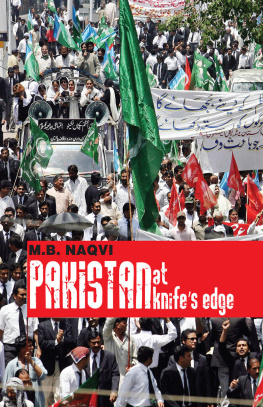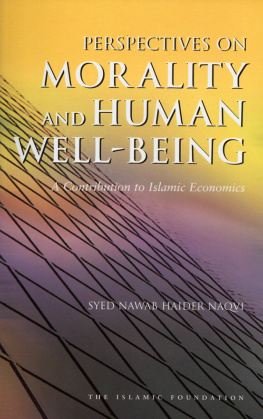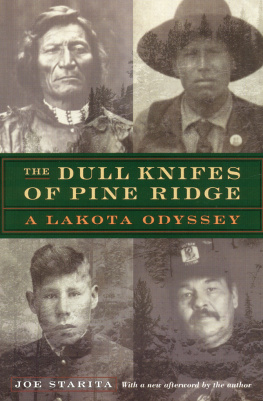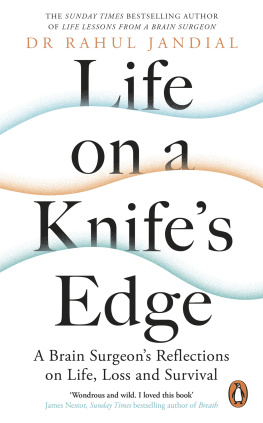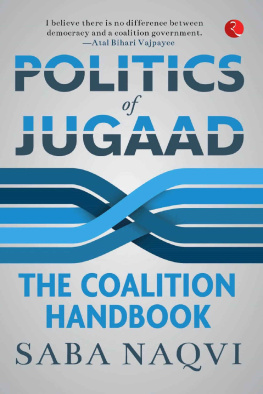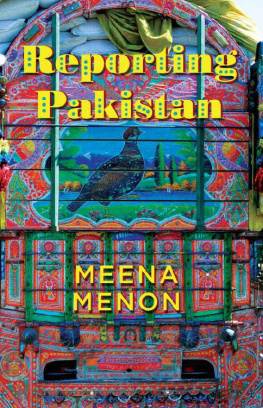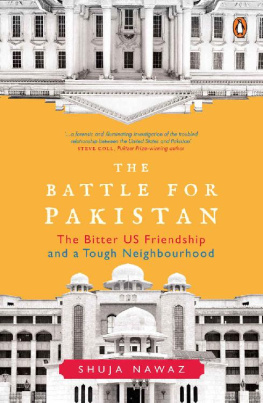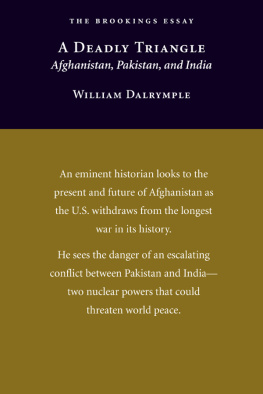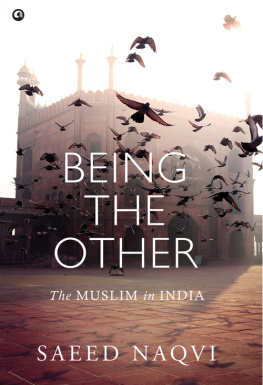About the book
Pakistan at Knife's Edge is veteran journalist M B Naqvi's understanding of contemporary Pakistan and the directions the country could take or ought to. From the sacking of the chief justice of the Supreme Court, Iftikar Muhammad Chaudhry, by General Pervez Musharraf, to the return of Benazir Bhutto and her assassination on 27 Deceber 2007, the book traces the lawyers agitation to the general elections in 2008, and also the rise of a more vocal civil society.
M B Naqvi focuses on the lawyers movement for judicial autonomy and reinstatement of democracy and derives great hope from it; the movement has become a locus for a more broad-based demand for democracy raised by civil society. So Pakistan is poised at knifes edge: which way will it go?
A human rights activist and fervent supporter of liberal democratic dispensation, Naqvi presents a compelling blueprint for the future of the country.
About the author
M B Naqvi was a prominent journalist based in Karachi ,Pakistan . Born in Amroha (India) he migrated to Pakistan in 1947. His journalistic career began in 1956 when he joined The Indus Times and later Radio Pakistan in Rawalpindi. In a career spanning fifty years, M B Naqvi wrote on both domestic as well as international affairs for The Observer, Gulf News, Dawn, The News, Newsline, Globe, Herald, Frontier Post, The Muslim, Deccan Herald, Times of India and Daily Star . He was a frequent commentator for the BBC as well as a regular guest on Pakistani television, invited to comment on current affairs.
M B Naqvi continued to write until five days before his death. He jointly authored Making Pakistan a Tenable State along with sixteen other writers. He has contributed chapters to two books, The Security of South Asia American and Asian Perspectives and Europe and the Third World . Most recently, he was the Voice of Authority on Pakistan affairs for the website www.pakusonline.com .


ROLI BOOKS
This digital edition published in 2015
First published in 2010 by
The Lotus Collection
An Imprint of Roli Books Pvt. Ltd
M-75, Greater Kailash- II Market
New Delhi 110 048
Phone: ++91 (011) 40682000
Email: info@rolibooks.com
Website: www.rolibooks.com
Copyright M.B. Naqvi, 2010
No part of this publication may be reproduced, transmitted, or stored in a retrieval system, in any form or by any means, whether electronic, mechanical, print reproduction, recording or otherwise, without the prior permission of Roli Books. Any unauthorized distribution of this e-book may be considered a direct infringement of copyright and those responsible may be liable in law accordingly.
eISBN: 978-93-5194-076-0
Cover Design: Supriya Saran
All rights reserved.
This e-book is sold subject to the condition that it shall not, by way of trade or otherwise, be lent, resold, hired out, or otherwise circulated, without the publishers prior consent, in any form or cover other than that in which it is published.
Dedication
I dedicate this book to the lawyers of Pakistan and its superior judiciary, who have shown by their recent brave conduct that they mean to remain in the forefront of democratic forces in this overly militarized country.
This movement started almost by a typical incident when an unaccountable military dictator, General Pervez Musharraf, secure in his powers over every segment of the government, demanded the resignation of the Chief Justice of Pakistan (CJP), Justice Iftikhar Muhammad Chaudhry, who refused. This was a magical moment of history and a whole chain of events started. This judge had been on good personal terms with Musharraf but over the years his judicial activism and bold independence had so frustrated the dictator as to make him go over the top and decided to sack him, if he did not tamely resign on demand. Justice Chaudhry stood his ground and challenged him to try him in an open court of law, if he had done anything illegal.
That no to Musharraf was followed by Justice Chaudhrys arrest, maltreatment and harassment. It electrified the legal fraternity and the rest of the people. It is over two years since. Many shameful and illegal acts by the dictator followed, including the sacking of as many as sixty-two judges of Supreme and High courts and keeping many of them locked up in their homes. But the lawyers movement was only strengthened. Although Musharrafs successors have managed to tempt, browbeat or threaten many of these judges into seeking re-employment into their old jobs some remained unbending. This lawyers movement has shaped the substance of politics by ensuring that democracy will take roots in the soil and that the generals had better remain confined to their military jobs. One usurper has been sent home largely as a result of the soul-lifting way the sacked judges had to be restored to their offices. It was a grand victory of the people, though curiously Pakistan Peoples Party boys who prevented people from Sindh and Balochistan to join the people of Punjab, specifically of Lahore and Gujranwala. A salute to the leadership of Mian Nawaz Sharif of Raiwind, who inspired and mobilized these people, is also called for.
The fight for Pakistanis human rights is far from being over, though a framework for that however exists. Lawyers and the rest of civil society have to make sure that the empty shells of democracys institutions do not remain without the soul and substance of democracy: equal human rights for all enshrined in law and respected by those who govern.
Contents
Preface
T his is not a treatise or a work of research; it is just a glance at troubled Pakistan as it is today and how it is likely to develop, identifying the forces at work in transforming it.
An effort, however, has been made to look at the issues in perspective. I, as a writer, do not live in an ivory tower; I am a human rights activist and a fervent supporter of the liberal democratic dispensation. Therefore, my prejudices and prepossessions can easily be noted by readers.
I do hope that my readers will take meaningful interest in problems that the people of Pakistan face. Our democratic struggle will be reinforced by their support.
One-Man Rule: Compulsions
A lthough one or even a few individuals cannot radically change the fortunes of a whole people, in Pakistans case, one is forced to be individual-centric in describing history or writing scenarios for its near future. The question here is: what is to be expected in Pakistan? After a brief historical outline has been sketched out, the reality is that, in the place of a political class and organized governance, what Pakistan now has is one-man rule despite the resignation of General Pervez Musharraf. In all essentials, only General Musharraf, the chief of army staff, who also wore the additional hat of the president of the Islamic Republic, mattered until August 2008; and now, the new president, Asif Ali Zardari, also co-chairman of Pakistan Peoples Party (PPP), is who counts. Everyone, from the prime minister down to the bureaucracy as well as intelligence services and subordinate departments, take their cue from the policy decisions the president takes. Nobody else matters. There is supposed to be a Parliament with all the usual appurtenances, but what counts is the will of this man at the top.
True, the president has advisers. But who are they? Apart from the advice of international financial institutions WTO, World Bank, IMF, Paris Club, Asian Development Bank, American Treasury et al on economic matters, the prime minister and coterie of advisers seem to take decisions more or less autonomously. Even here broad outlines of business as usual goes on. What the boss desires is the ideal. It is really a coterie of a few ministers and officials who manage both finance and development. This coterie runs the economy, insofar as it is possible, in accordance with the economic paradigm of globalization. Pakistan started acting on the IMFs Structural Adjustments Programme way back in the 1970s and 1980s; globalization being an amplification of those adjustments. As for politics, Musharrafs real advisers constituted a sort of Parliament of top generals who assembled every month to review the political and security situation. They took the policy decisions; although the generals gave their input, Musharraf was a primus inter pares. Execution was the business of the civil bureaucracy and even the government as such was an obedient tool; true, a few bureaucrats did become second-rank advisers. For dealing with the Parliament and other parties, President Musharraf consulted primarily two individuals: Chaudhry Shujaat Hussain, the president of the governing Pakistan Muslim League (Qaid-e-Azam) [PML (Q)] and his cousin, Chaudhry Pervez Elahi, the chief minister of Punjab, the key province of Pakistan. The president had identified himself with the Q League and was already in election mode, campaigning primarily for the party in preparation for the elections that were due late in 2007. Other allied parties continued to support him in the hope of sharing office, even if power eluded them largely because they had no alternative course while the Opposition claimed that Parliament is nothing more than a rubber stamp since no major decision was taken in it and no substantive legislation was passed by its members. The will of one man prevailed and that was the supreme law, in practice.



